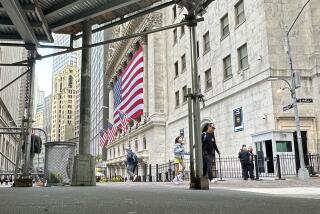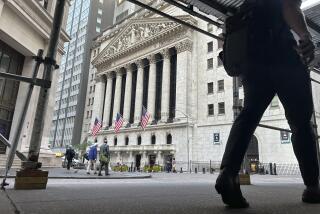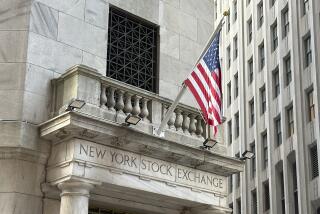Stock market rebounds but concerns remain that tax cuts might overheat the U.S. economy
President Trump has boasted that the Republican tax cuts would add rocket fuel to the economy.
But rockets can accidentally explode.
Some analysts believe the extra stimulus of the tax cuts, which will boost wage growth and government borrowing in an already strong economy, helped ignite the recent stock market volatility that continued Tuesday with another wild session on Wall Street.
One day after a record point drop in the Dow Jones industrial average, the index of top stocks went on a roller-coaster ride that ultimately erased nearly half of Monday’s losses after bargain-hunters swooped in.
The gyrations had Treasury Secretary Steven T. Mnuchin warily checking his iPhone even as he tried to assure lawmakers there was nothing to worry about.
“I’m not overly concerned about the market volatility,” Mnuchin told the House Financial Services Committee Tuesday. “The fundamentals are quite strong.”
But concerns that rising wages, soaring federal deficits and projected increased government spending will trigger higher inflation and interest rates helped send the Dow plunging — down more than 500 points — when the market opened Tuesday morning.
The index then erased the losses and gained more than 300 points, before toggling between gains and losses and ending with a rally.
The Dow closed up 567.02 points, or 2.3%, at 24,912.77. The broader Standard & Poor’s 500 index gained 1.7% and the technology-heavy Nasdaq composite index jumped 2.1%.
“We’ve probably got a little more stimulus than we needed in the tax cuts and to have federal spending also sharply higher in a period when the economy is solid is like adding more gasoline to the economy,” said Gregory Valliere, chief global strategist at Horizon Investments, an investment management firm.
Factor in a growing global economy and, Valliere said, “there’s almost too much stimulus.”
That led investors to dump stocks in favor of bonds. The yield on the benchmark 10-year Treasury bond is up sharply over the last month and ended Tuesday at 2.80%.
Higher interest rates would make stocks less attractive. Investors could opt for safer, higher-yielding bonds in their search for returns.
Trump administration officials have predicted the tax cuts would lead to higher economic growth that eventually will more than offset the lost revenues. But an analysis by Congress’ nonpartisan Joint Committee on Taxation said that won’t happen and the federal budget deficit will increase by about $1 trillion over the next decade. That is partly because higher interest rates will drive up the cost of government borrowing.
Top Trump administration officials and congressional Republicans downplayed Monday’s stock market plunge, saying the economy’s fundamentals were strong even as they acknowledged the volatility on Wall Street had gained their attention.
“I normally would’t be looking at my iPhone, but given the market moves, I’m checking it,” Mnuchin said, glancing down at his phone during the Financial Services Committee meeting.
“It’s now up 187 points,” he said of the Dow just before 8 a.m. Pacific time, “so we’re back up today.”
But a few minutes later, the index went negative again.
“We are very focused on the long-term economic growth and we believe the policies we’ve enacted, including tax reform, are very positive for long-term economic growth,” Mnuchin said.
The Treasury Department was monitoring financial markets and they were “functioning very well,” he said.
Mnuchin added that despite recent declines, “the stock market is up significantly, over 30%, since Trump was elected.”
On Monday, the Dow closed 33% higher than it did the day Trump was elected. The S&P 500 index, which investors tend to favor as a gauge of the U.S. stock market, was up 24% in that span.
But Monday’s steep plunge by the Dow of 1,175 points, or 4.6%, added to a decline in recent days, wiping out the Dow’s and S&P 500’s gains for the year.
Tuesday’s gains pushed the Dow and S&P 500 back into positive territory for 2018.
Trump has boasted continually in recent months about the booming stock market. He was silent on Monday’s declines.
The White House issued a statement late Monday about the market drop, saying: “The president’s focus is on our long-term economic fundamentals, which remain exceptionally strong, with strengthening U.S. economic growth, historically low unemployment, and increasing wages for American workers.”
And Rep. Jeb Hensarling (R-Texas), chairman of the House Financial Services Committee, said at Tuesday’s hearing that the recent market downturn was a predictable result of a strengthening economy and that Americans should see it as a positive sign.
“After eight years of failed economic policies that led to the slowest, weakest recovery in the modern era,” he said, taking a jab at the Obama administration, “the economy is starting to take off and wages are finally growing again. Consumer optimism abounds.”
“So how ironic but totally predictable that equity markets would now swoon over the prospects of higher interest rates and possible inflation associated with a breakout of economic growth,” Hensarling told Mnuchin. “Artificially low interest rates may have benefited some on Wall Street, but they haven’t been particularly helpful to Main Street.”
Valliere said rising interest rates cut both ways depending on a person’s financial situation.
“If you’re a senior citizen and you were counting on higher yields in your retirement, this is great,” he said. But “this is not good news” for people looking to take out a loan for a car or a house.”
The government reported Jan. 26 that the economy grew 2.3% in 2017, a significant improvement over the previous year’s 1.5% growth. It was the best performance since the economy expanded 2.9% in 2015.
Then on Friday, the Labor Department said job growth was strong again in January, with wages rising 2.9% over the previous 12 months. That was the best year-over-year wage growth since 2009.
Those developments fueled investors’ fears that the Federal Reserve might need to push its key interest rate up to head off higher inflation that could be fueled by the extra stimulus of the tax cuts.
Interest rates also are being pushed up by increased borrowing by the federal government, which is facing higher budget deficits because of the loss of revenue this year from the tax cuts.
The Treasury Department said last week that it expected to borrow $955 billion in the 2018 fiscal year, which began Oct. 1. That’s up sharply from $519 billion the previous year, and it would be the most federal borrowing since 2012, when the economy was still in the early stages of recovery from the Great Recession.
The Treasury Department estimated it would need to borrow $1.08 trillion in fiscal 2019 and $1.12 trillion the following year. Increased borrowing pushes up interest rates.
On top of that, Congress is working on legislation that would boost defense and other spending above existing caps, providing additional stimulus to the economy.
Michael Arone, chief investment strategist at State Street Global Advisors, an investment management firm, said financial markets are undergoing a “good old-fashioned market correction” as investors adjust to the prospect of higher interest rates and inflation.
Average investors shouldn’t overreact, he said.
“My recommendation to investors is: [If] they have a long-term, disciplined investment plan, stick to it because the fundamentals of this market are still pretty strong,” Arone said.
Twitter: @JimPuzzanghera
UPDATES:
3:50 p.m.: This article was updated with closing stock prices, more analysis and comments from Gregory Valliere, chief global strategist at Horizon Investments, and Michael Arone, chief investment strategist at State Street Global Advisors.
9 a.m.: This article was updated with additional comments from Treasury Secretary Steven Mnuchin and with comments from Reps. Jeb Hensarling and Carolyn Maloney, as well as additional details about Tuesday’s financial markets movement and recent Treasury borrowing estimates.
This article was originally published at 8:05 a.m.
More to Read
Inside the business of entertainment
The Wide Shot brings you news, analysis and insights on everything from streaming wars to production — and what it all means for the future.
You may occasionally receive promotional content from the Los Angeles Times.











